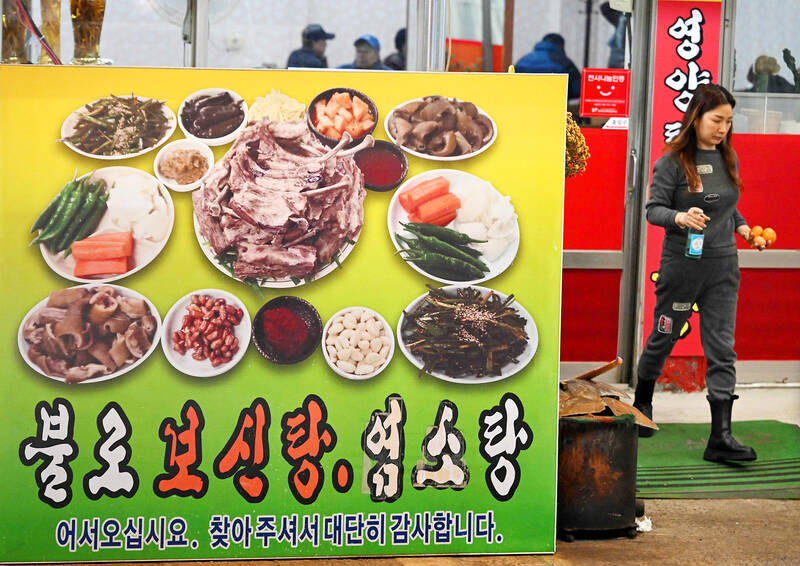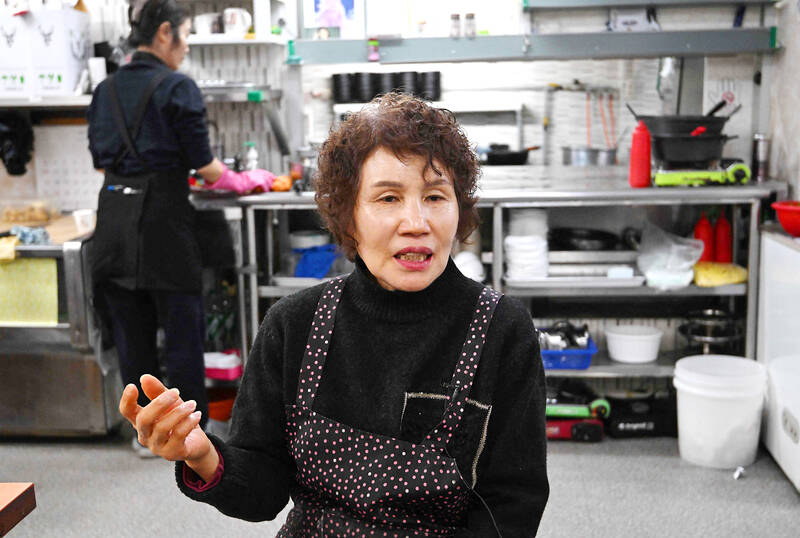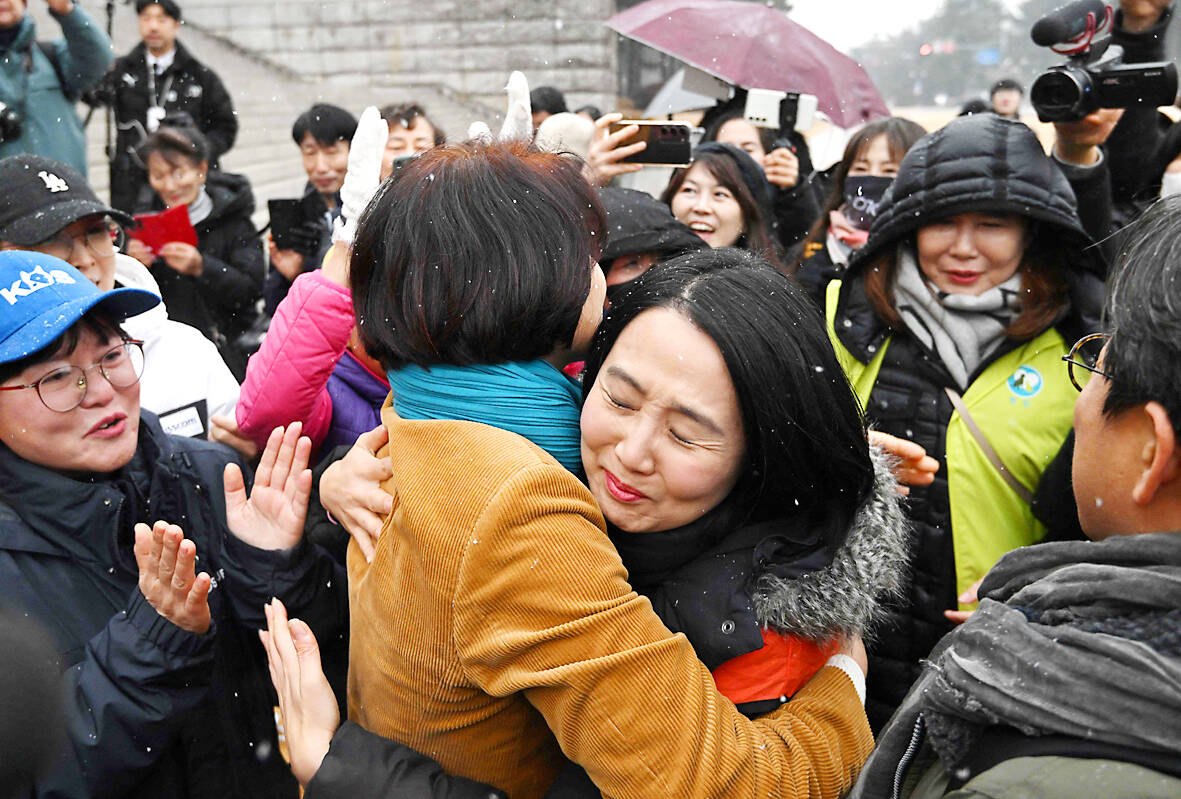Like most young South Koreans, Annie Ko rarely ate dog meat, but her annual visits to a restaurant serving the dish did little to trouble her conscience. And she was only vaguely aware of the international criticism that led to last week’s vote to ban the breeding, slaughter and sale of dog meat in the country.
It was when she volunteered as an interpreter for Humane Society International that her views on eating dog meat — a tradition some claim goes back centuries — changed dramatically.
Her volunteer work took her to farms that breed dogs for slaughter, their meat eventually ending up in stews and other dishes that devotees claim help fend off fatigue caused by the country’s hot and humid summers.

Photo: AFP
Then she adopted DeeJay, who had been rescued from a dog farm.
“I’d had a year or two to witness what actually goes on at dog farms before I got my dog … it was an important learning experience,” said Ko, a member of the Seoul-based electric rock duo Love X Stereo.
“When you’re at a restaurant, you don’t really see the process, but that changes once you’re at a farm and see how horrible the situation is, how badly the dogs are treated and how they carry all these diseases … stuff that makes you feel that this is wrong in so many ways.”

Photo: AFP
Over the years, activists have documented the cruelty of the industry. Dogs are subjected to deplorable conditions, confined to cages amid putrid surroundings infested with diseases and faeces, and often left with untreated wounds. They are fed discarded food waste, often containing harmful ingredients. They are strangulated by hanging, beaten or even electrocuted, sometimes over prolonged periods.
Breeders, many of whom are older and see the dog meat trade as a way out of poverty, argue that conditions have improved in recent times.
‘THE POLITICAL NARRATIVE CHANGED’

Photo: AFP
Despite the horrors highlighted by campaigners, few politicians appeared willing to act. Consumption has been in decline for decades and is now largely confined to older South Koreans who want a fix of culinary nostalgia. But the industry is no financial minnow. There are about 1,150 farms, while 1,600 restaurants sell dog meat dishes, according to the agriculture ministry. Activists say as many as 1 million dogs a year are slaughtered.
In 2022, activists found an unlikely ally in the incoming president Yoon Suk-yeol and his wife, Kim Keon-hee.
Voters knew that Yoon, a conservative, would take a tougher stance on North Korea’s nuclear program and attempt to roll back the progressive domestic policies of his liberal predecessor, Moon Jae-in. But no one identified him as an ally in the campaign that culminated in the national assembly’s recent decision to make the dog meat trade illegal from 2027.
Yoon and Kim, who own several dogs, had made no secret of their opposition to dog meat consumption. According to government data, there are more than 6 million pet dogs in South Korea, and demand for dog meat is at an all-time low. A recent Korea Research International opinion poll commissioned by the animal rights group Aware found 93 percent of people had no intention of eating dog meat, while 82 percent supported a ban, up from 73 percent in 2022.
In the national assembly, 208 voted for the ban, with just two abstentions.
“The political narrative changed very quickly,” Ko said. “And I think that has a lot to do with the current government.”
The agriculture minister, Song Mi-ryung, said criminalizing the trade reflected South Korea’s transformation into a society that prioritizes animal welfare.
“Now is the time for the government to take action to swiftly resolve the issue of dog meat consumption,” she said.
Many have credited Moon, who was president from 2017-22, with boosting the campaign against the trade. In 2017, he adopted Tori, a rescue dog, and four years later suggested the time had come to ban the consumption of dog meat.
ANIMALS AS COMPANIONS
The law includes a three-year grace period before the ban comes into effect, and financial help for breeders, but many in the industry condemned it as an attack on their way of life.
Joo Young-bong, the head of a nationwide association of dog meat farmers, said producers were in a “state of despair.”
“Prohibiting what people eat has no precedent in history,” Joo said in a radio interview. “People have recovered their health and improved their wellbeing after eating dog meat. We are aware that consumption has been falling, but it is absurd to ban people from eating what they like. It feels like we’ve become a ‘dog republic.’ There are more people walking around with dogs than there are holding babies.”
Kim Dong-hyun, a Seoul-based filmmaker and owner of a Maltese dog, had doubts about condemning the entire industry.
“I don’t think old practices will die out that easily,” he said. “The focus should be on fostering better conditions and removing the cruelty element for these animals rather than outright opposition. At the same time, I wonder if this is realistic when some say that beating a dog to death makes it taste better.”
Others said the law would end widespread suffering.
“Like many of my friends, I was tricked into eating dog meat as a child,” said Kim Seo-hyun, a student in Gyeonggi province. “Older generations say it’s good for our health, but knowing the cruel way dogs are treated makes me sick, and I am happy it is finally being banned.”
Ko acknowledged that dog meat was a source of protein after the war, when millions of Koreans battled poverty and malnutrition. “Dogs were everywhere then, so I think they were an obvious choice,” she said. “But these days, people want animals as companions.”

By 1971, heroin and opium use among US troops fighting in Vietnam had reached epidemic proportions, with 42 percent of American servicemen saying they’d tried opioids at least once and around 20 percent claiming some level of addiction, according to the US Department of Defense. Though heroin use by US troops has been little discussed in the context of Taiwan, these and other drugs — produced in part by rogue Chinese Nationalist Party (KMT) armies then in Thailand and Myanmar — also spread to US military bases on the island, where soldiers were often stoned or high. American military policeman

Under pressure, President William Lai (賴清德) has enacted his first cabinet reshuffle. Whether it will be enough to staunch the bleeding remains to be seen. Cabinet members in the Executive Yuan almost always end up as sacrificial lambs, especially those appointed early in a president’s term. When presidents are under pressure, the cabinet is reshuffled. This is not unique to any party or president; this is the custom. This is the case in many democracies, especially parliamentary ones. In Taiwan, constitutionally the president presides over the heads of the five branches of government, each of which is confusingly translated as “president”

An attempt to promote friendship between Japan and countries in Africa has transformed into a xenophobic row about migration after inaccurate media reports suggested the scheme would lead to a “flood of immigrants.” The controversy erupted after the Japan International Cooperation Agency, or JICA, said this month it had designated four Japanese cities as “Africa hometowns” for partner countries in Africa: Mozambique, Nigeria, Ghana and Tanzania. The program, announced at the end of an international conference on African development in Yokohama, will involve personnel exchanges and events to foster closer ties between the four regional Japanese cities — Imabari, Kisarazu, Sanjo and

Sept. 1 to Sept. 7 In 1899, Kozaburo Hirai became the first documented Japanese to wed a Taiwanese under colonial rule. The soldier was partly motivated by the government’s policy of assimilating the Taiwanese population through intermarriage. While his friends and family disapproved and even mocked him, the marriage endured. By 1930, when his story appeared in Tales of Virtuous Deeds in Taiwan, Hirai had settled in his wife’s rural Changhua hometown, farming the land and integrating into local society. Similarly, Aiko Fujii, who married into the prominent Wufeng Lin Family (霧峰林家) in 1927, quickly learned Hoklo (commonly known as Taiwanese) and